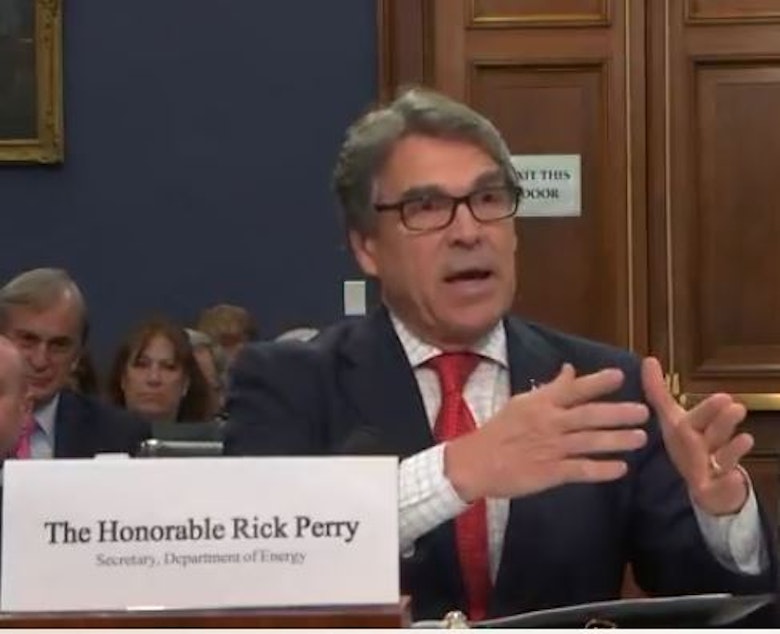WA Republicans join Democrats in opposing Trump energy budget cuts

Both Democrats and Republicans pushed back against cuts proposed for the U.S. Department of Energy when Energy Secretary Rick Perry came to Capitol Hill on Tuesday.
Washington state Republicans criticized Trump administration proposals to lop one-fourth off efforts to clean up radioactive waste at the Hanford Nuclear Reservation and sell off much of the Northwest’s high-voltage power grid.
Overall, the U.S. Department of Energy would lose 5 percent of its funding under the 2018 budget proposed by the Trump administration. That relatively small overall reduction masks the widely varying fates envisioned for the very different arms of the Department of Energy.
The White House aims to boost spending on nuclear weapons — which are overseen by the energy department – by $1.4 billion, an 11 percent increase. Among other cuts, the White House would slash $1.4 billion from the department’s Office of Energy Efficiency and Renewable Energy, a 69 percent decrease.
Cleanup at the Hanford nuclear site would lose about $100 million of its federal funding next year.
Sponsored
Republican Rep. Dan Newhouse said cuts of about $200 million at the Pacific Northwest National Laboratory in Richland would eliminate 1,000 jobs in his district.
"With those cuts, how does the administration plan to main our position as a world leader in scientific research?" Newhouse asked Perry at the House Appropriations subcommittee hearing.
Perry said his department’s national laboratories are “truly national treasures” and said he didn’t agree with the job loss estimates.
“These labs are going to be continuing to be the future of this country from the standpoint of innovation in technology,” Perry said.
Republican Jaime Herrera Beutler of Vancouver said cuts to the department’s hydropower programs would hurt her southwest Washington district and the nation as a whole.
Sponsored
"China plans to invest $360 billion in renewable power generation by 2020, including $73 billion in hydropower alone,” Herrera Beutler said. “I just feel like they’re gobbling up assets in this area. They want to eat our lunch and pop the sack."
Herrera Beutler also panned the budget’s proposal to sell off the transmission lines of the Bonneville Power Administration, a self-funding agency that markets power from federal dams across the Pacific Northwest and provides 28 percent of the region’s electricity.
A bipartisan group of 21 U.S. Senators wrote Perry earlier in June to oppose the dismantling of BPA and its counterpart agencies in other parts of the country.
Perry said the United States remains committed to being a global leader in clean-energy technology.
“This budget, I fear, cedes that leadership to China,” the subcommittee’s ranking Democrat, Marcy Kaptur of Ohio, said. “This is anything but an America-first policy.”
Sponsored
Democrat Nita Lowey of New York said Trump’s energy budget would do grievous harm.
“We are at a pivotal moment in world history,” Lowey said. “There is still time to protect the world from the disastrous impacts of climate change, yet your budget proposes to reduce energy efficiency and renewable energy by a staggering $1.43 billion.”
Legislators, not Presidential appointees, decide how to spend U.S. taxpayers' money.
"I was governor long enough to know that governors' budgets don’t always come back to you the way they start,” Perry, the former governor of Texas, said.
One of his answers did please the committee’s Democratic minority.
Sponsored
While White House lawyers have reportedly told various federal agencies to ignore requests for information from Congressional Democrats, Perry said the energy department would promptly answer any requests, whether from Democrats or Republicans.
Perry also said he looked forward to touring the Hanford site later this summer.
John Ryan loves getting tips and documents. He can be reached at jryan@kuow.org or on the encrypted Signal or WhatsApp apps at 1-401-405-1206 (whistleblowers, never do so from a work or government device, account or location). For greatest security, use KUOW's SecureDrop portal. Snail mail is also a safe way to reach him confidentially: KUOW, 4518 University Way NE #310, Seattle, WA 98105. Don't put your return address on the outside.

